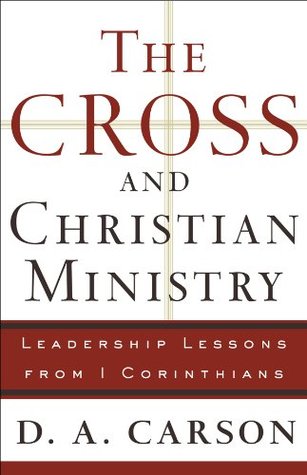More on this book
Kindle Notes & Highlights
by
D.A. Carson
Read between
April 3 - April 4, 2018
He took the student back to the cross and worked outward from that point.
Faithful Christian leaders must make the connections between creed and conduct, between the cross and how to live. And they must exemplify this union in their own lives.
Mere talk will not change people; the gospel will.
That is why Paul urges people to live a life worthy of the calling they have received (Eph. 4:1). It is why Paul prays that believers may live a life worthy of the Lord, the crucified Messiah, and may please him in every way (Col. 1:10).
Their allegiance to Jesus Christ and his kingdom is self-consciously set above all national, cultural, linguistic, and racial allegiances. Their commitment to the church, Jesus’s messianic community, is to the church everywhere, wherever the church is truly manifest, and not only to its manifestation on home turf. They see themselves first and foremost as citizens of the heavenly kingdom and therefore consider all other citizenship a secondary matter. As a result, they are single-minded and sacrificial when it comes to the paramount mandate to evangelize and make disciples.
The church, of course, is the only institution with eternal significance.
He sees himself, rather, in a third position, from which he has to flex to win Jews on the one hand and Gentiles on the other.
that the average first-century Jew would have said, “Wait a minute! Circumcision is one of God’s commands. How can you say that circumcision is nothing, and then immediately comment, ‘Keeping God’s commands is what counts’?” The only answer is that, for Paul, the commands of God that he finds operative for the Christian cannot be equated with
the Mosaic code.
It is no longer the law-covenant that binds him to the God of his fathers.
“I am not free from God’s law,” he writes, “but am under Christ’s law” (emphasis added). The expression is a peculiar one, but the heart of the idea is clear enough. All of God’s demands upon him are mediated through Christ. Whatever God demands of him as a new-covenant believer, a Christian, binds him; he cannot step outside those constraints.
Christians are those who pray that the power of God may so rest on them that Christ dwells in their hearts through faith, while they themselves increasingly grasp the limitless dimensions of God’s love for them in
Christ Jesus (Eph. 3:14–21).
How can Christians stand beside the cross and insist on their rights?
We must not stand on our rights. As long as defending our rights remains the lodestar that orders our priorities, we cannot follow the way of the cross.
In some instances, standing on one’s rights may be exactly what is called for. Yet one should always be ready to abandon the appeal to one’s rights.
How will this course of action contribute to, or hinder, the work of the gospel?
We must adopt as our aim the salvation of men and women. That vision will enable us to avoid cloister Christianity. We need to meditate on Psalms 96 and 98; Isaiah 49:1–13; Jeremiah 12:12–33; Micah 4; Colossians 1:15–29; and Revelation 4–5.
But to follow the crucified Messiah means Paul must take up his own cross daily, die to self-interest, and serve the One who bought him. One cannot properly promote the gospel any other way.
dying to self-interest, giving up all insistence upon the sacredness of one’s rights, and striving to win as many as possible—is to follow Christ crucified, who died, literally, to his self-interest, gave up all insistence upon the sacredness of his very real rights, and set himself to win men and women from every people and tongue and tribe and nation.


